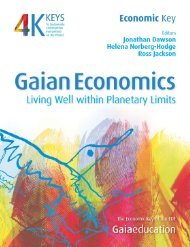Designing Ecological Habitats - Gaia Education
Designing Ecological Habitats - Gaia Education
Designing Ecological Habitats - Gaia Education
Create successful ePaper yourself
Turn your PDF publications into a flip-book with our unique Google optimized e-Paper software.
10 <strong>Designing</strong> ecological <strong>Habitats</strong><br />
volumes of production. The supreme goal in all countries is to raise incomes,<br />
‘living standards’ and the GDP as much as possible, relentlessly, without any<br />
notion of limits; that is, the most important social goal is economic growth.<br />
If we assume a) three per cent per annum economic growth, b) a population<br />
of nine billion, c) all the world’s people rising to the ‘living standards’ we in<br />
the rich world would have in 2070 given three per cent growth, then the total<br />
volume of world economic output would be 60 times as great as it is today.<br />
So even though the present levels of production and consumption are grossly<br />
unsustainable, the determination to have continual increase in income and<br />
economic output will multiply these towards absurdly impossible levels in<br />
coming decades.<br />
This ‘limits to growth’ perspective is essential if we are to understand the<br />
most serious global problems facing us:<br />
1. The environmental problem is basically due to the fact that far too<br />
much producing and consuming is going on, taking too many resources<br />
from Nature and dumping too many wastes into Nature. It cannot be<br />
solved in an economy that is geared to providing ever-rising production,<br />
consumption, ‘living standards’ and GDP.<br />
2. Third World poverty and underdevelopment are inevitable if a few living<br />
in rich countries insist on taking far more of the world’s resources than is<br />
their share. The Third World can never develop to rich world ways, because<br />
there are far too few resources for that (see Note 1).<br />
3. Conflict and war are inevitable if all aspire to rich-world rates of<br />
consumption, and if rich countries insist on never-ending growth on a<br />
planet with limited resources (see Note 2).<br />
Fault 2: It is a Grossly Unjust Society<br />
We in rich countries could not have anywhere near our present ‘living<br />
standards’ if we were not taking far more than our fair share of world<br />
resources. Our per capita consumption of items such as petroleum is around<br />
17 times that of the poorest half of the world’s people. The rich 1/5 of the<br />
world’s people are consuming around 3/4 of the resources produced. Many<br />
people get so little that 850 million are hungry and more than that number<br />
have dangerously dirty water to drink. Three billion live on $2 per day or<br />
less. Conditions for the world’s poorest are deteriorating.<br />
This grotesque injustice is primarily due to the fact that the global<br />
economy operates on market principles. In a market, need is totally irrelevant<br />
and is ignored – things go mostly to those who are richer, because they can<br />
offer more to pay for them. Thus we in rich countries get almost all of the<br />
scarce oil and other resources traded, while billions of people in desperate<br />
need get little or none. This explains why one third of the world’s grain is<br />
fed to animals in rich countries while tens of thousands of children die every<br />
day because they have insufficient food and clean water.<br />
Even more importantly, the market system explains why Third World<br />
development is so very inappropriate to the needs of Third World people.







